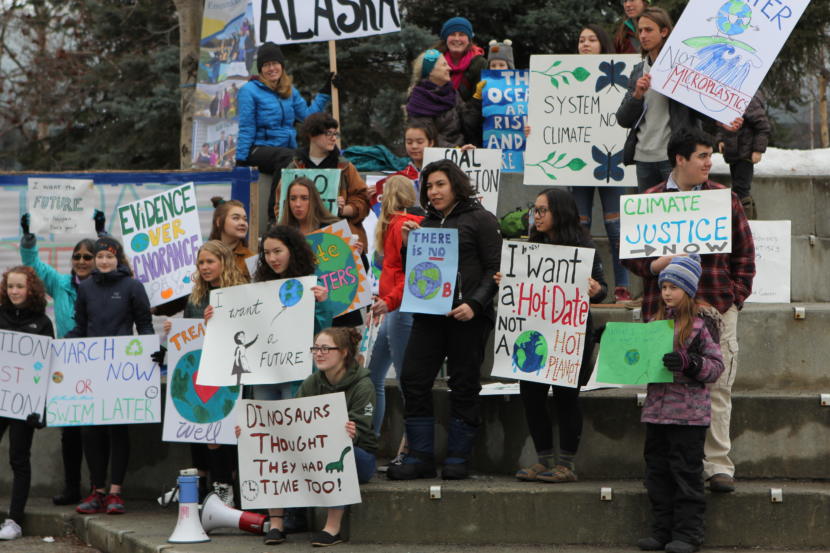
Alaska is at the forefront of climate change in the U.S. — it’s warming faster than any other state, and more than 60% of Alaskans say it’s an issue they’re concerned about.
Alaska Public Media sent a questionnaire to candidates for U.S. House, U.S. Senate and Alaska governor that included questions about climate change.
U.S. House candidate Sarah Palin and gubernatorial candidate Charlie Pierce, both Republicans, were the only candidates who said they do not believe human activities are driving climate change. U.S. Senate candidate Kelly Tshibaka, U.S. House candidate Nick Begich and incumbent Gov. Mike Dunleavy, also Republicans, acknowledged the impacts of human activities, but said that shouldn’t translate to scaling back resource development.
Palin hit that point home in a televised debate last month.
“We need to drill, baby, drill,” she said, arguing that increasing oil production is the only way to bring down historic inflation.
On the candidate survey, Palin called climate change a “fraud.” In the debate, she also expressed doubts about increasing investment in renewable energy.
“A lot of the green energy projects … a lot of those are boondoggles, a lot of those are just some crony capitalism projects that politicians pass on to their friends,” she said.
Democratic gubernatorial candidate Les Gara said he supports ConocoPhillips’ Willow project and selling Alaska’s oil “while it’s still marketable.” But at the same time, Gara has been a loud proponent of cutting oil tax credits as a way to fund state services and shift to clean energy. He’s talked about investing in carbon sequestration for natural gas production and building more renewable energy projects across Alaska.
“The world is asking for clean energy, right? They’re not asking for 1960s energy anymore,” Gara said at a debate last month hosted by the Alaska Resource Development Council. “We have to catch up with the world.”
Incumbent U.S. Rep. Mary Peltola, a Democrat and also a Willow project supporter, said Alaska is “uniquely positioned” to be a leader in tackling climate change. Peltola responded to our survey calling for ambitious climate solutions. She’s promised to fight for funding to support renewable energy development and study the salmon and halibut collapse in Western Alaska, which has been linked to climate change.
“While we adapt to our changing environment and implement measures to address the impact, like the relocation of Newtok to Metarvik, we need national leadership that prioritizes solutions as large as the problem we face,” she wrote.
And while Alaska is feeling the brutal environmental impacts of climate change, it’s also contending with the economic impacts of a world that is slowly transitioning out of fossil fuels, said Paasha Mahdavi, an associate professor at the University of California Santa Barbara who researches environmental politics.
“That’s a distinction that exists across these races — who is going to, at the bare minimum, just tackle the problems that Alaskans are facing right now? And then, not only do that, but allow the state to thrive in the context of the transition,” Mahdavi said.
Alaskans are already experiencing climate change in countless ways. A historic fall storm hit Western Alaska this year, fueled by warming ocean temperatures, permafrost thaw is buckling roads and receding sea ice is making subsistence hunts more dangerous.
At the same time, Alaska’s economy is heavily dependent on oil and gas, which could explain why every candidate running for U.S. House and Senate and state governor says they support continued development in the state.
Dunleavy and Tshibaka aren’t calling for an energy transition. They say oil and gas development should happen at the same time as investment in renewables.
“I don’t think we take an either/or approach,” Tshibaka said at a televised debate last month. “We can take an all-of-the-above approach as we move forward [with] renewable energy and clean energy development in Alaska.”
Both Dunleavy and Tshibaka say that energy produced in Alaska is a “cleaner” option than relying on sources elsewhere in the world. In the candidate questionnaire, Dunleavy noted, for example, Alaska has laws against flaring or venting natural gas.
“Stopping resource production in Alaska will only push it to other places with fewer environmental safeguards,” Dunleavy argued.
On the candidate survey, Republican U.S. Sen. Lisa Murkowski said it was the country’s responsibility to lower greenhouse gas emissions and lead other nations to do the same. She referenced legislation she has supported that funds renewable energy investments, carbon capture technology and phasing out the use of hydrofluorocarbons, a type of potent greenhouse gas used in air conditioning and refrigeration.
Independent gubernatorial candidate Bill Walker said he would re-establish the state’s Climate Action for Alaska Leadership Team, disbanded under the Dunleavy administration.
Mahdavi said across the country, Americans are more concerned about climate change than ever, but candidates are split in how they’re talking about it. Democrats, he said, are more often discussing the environmental and economic impacts of climate change than their Republican counterparts.
“Democrats didn’t used to talk about climate as much, and they are talking about climate far more than they ever have,” he said. He attributes the movement to President Joe Biden building climate change into his own campaign and writing climate resilience funding into major spending packages.
Mahdavi said to an extent, the national conversation is reflected in Alaska, too, where some candidates are willing to discuss a future in which oil and gas is less relevant, and others aren’t.